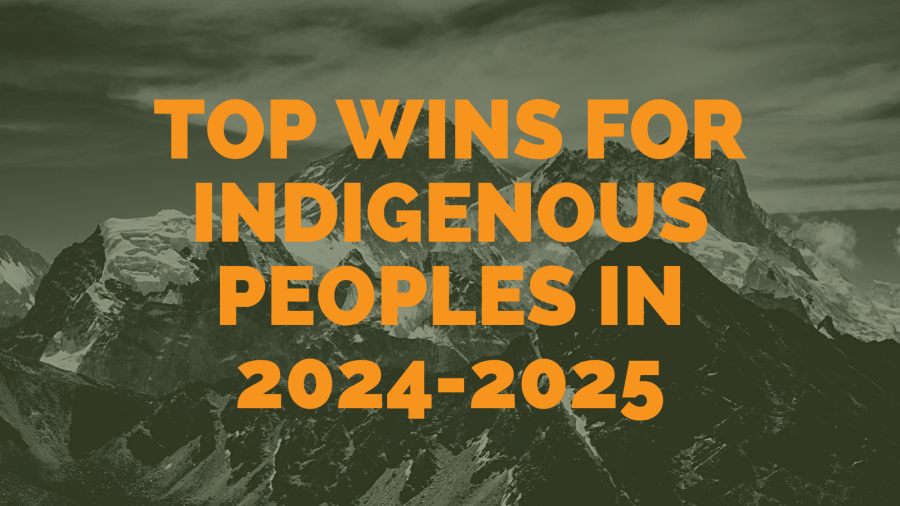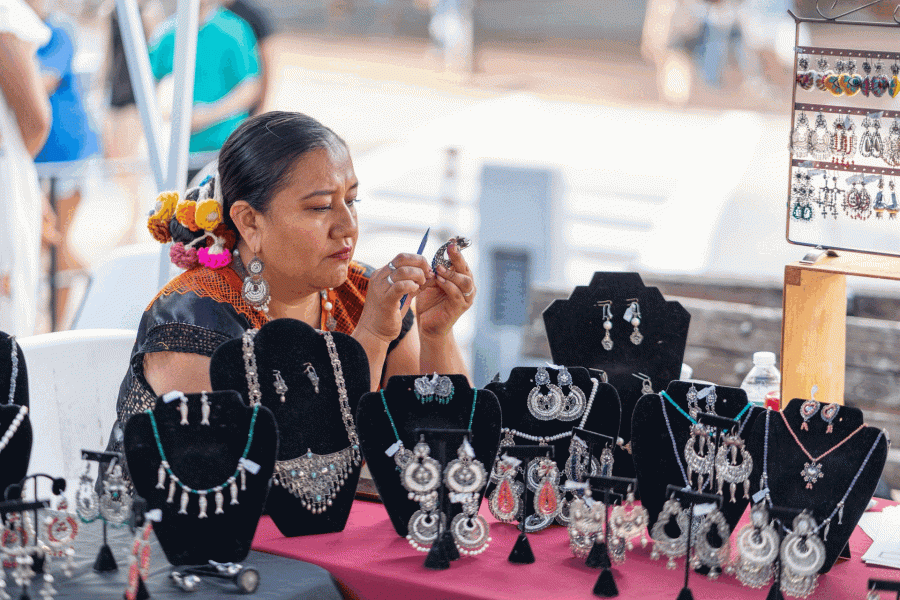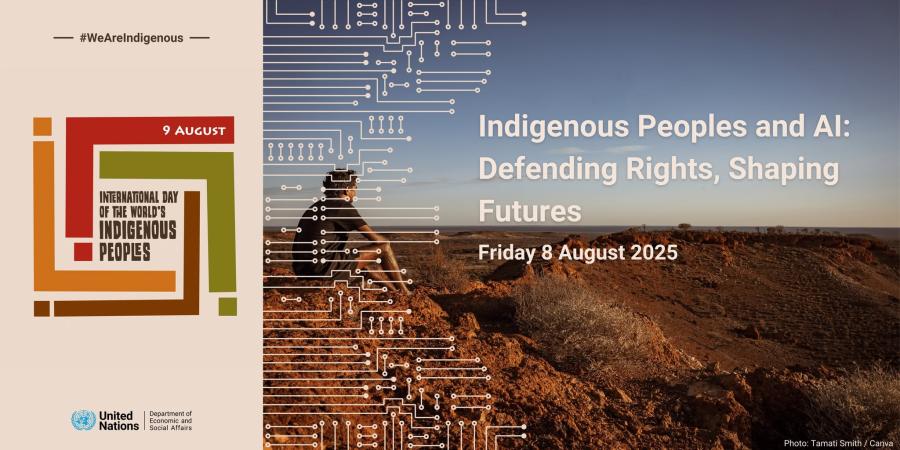
Today marks the 12th annual celebration of World Radio Day as proclaimed by UNESCO. This year's theme is "Radio and Peace."
On the first celebration of World Radio Day in 2012, former UN Special Rapporteur on the Rights of Indigenous Peoples James Anaya (Apache and Purépecha) emphasized the importance of community radio for the world's Indigenous Peoples, "Radio has been a fundamental means for Indigenous Peoples to maintain their languages and to exercise and defend their rights."
“Access to community radio is critical to the transmission of language, culture, and how Indigenous Peoples rely on this medium to inform and educate their communities, especially during the global health pandemic," says José Francisco Calí Tzay (Maya Kaqchikel), UN Special Rapporteur on the Rights of Indigenous Peoples.
Cultural Survival continues to work to implement Indigenous Peoples' right to establish their own self-determined communication platforms as enshrined in Article 16 of the UN Declaration on the Rights of Indigenous Peoples. In 2022, our Indigenous Community Media Fund supported 40 media projects in 16 countries totaling $248,000. Our Indigenous Fellowship program supported 28 youth in gaining new audiovisual and media leadership skills. Our Indigenous Rights Radio program produced over 450+ radio programs in 16 languages and distributed them to 831 radio partners across the globe.
Our advocacy for Indigenous community media focuses on pushing for the democratization of radio frequencies by changing telecommunication laws in countries where Indigenous Peoples want to have their own radio stations and where they face criminalization for claiming their right to freedom of expression. We continue to push for the implementation of the 2021 Inter-American Court of Human Rights ruling related to community radio stations in Guatemala.
In many parts of the world, despite the risk of police raids, jail time, threats, and even death for community journalists, community radio stations serve a vital function by distributing information about important news and educational programming like emergency disaster relief, voter registration, and public health campaigns. The power of radio reaches even the most rural areas, providing Indigenous communities with access to programming in their own languages and serves as a voice that promotes Indigenous cultures, traditions, and belief systems.
Support Indigenous Community Radio Today!
Learn about the Historic Win for Indigenous Community Radio!
 On December 17, 2021, the Inter-American Court of Human Rights announced its decision in the case Indigenous Maya Kaqchikel Peoples of Sumpango vs. Guatemala, declaring the Republic of Guatemala “internationally responsible for the violation of the rights to freedom of expression, equality before the law and participation in cultural life” of Indigenous Peoples. This decision is historic in protecting Indigenous Peoples' rights to expression and culture and promoting pluralism in media. The Court ordered the Guatemalan government to allow Indigenous broadcasters to operate "freely and without interference" and to legalize community radio stations. Learn more.
On December 17, 2021, the Inter-American Court of Human Rights announced its decision in the case Indigenous Maya Kaqchikel Peoples of Sumpango vs. Guatemala, declaring the Republic of Guatemala “internationally responsible for the violation of the rights to freedom of expression, equality before the law and participation in cultural life” of Indigenous Peoples. This decision is historic in protecting Indigenous Peoples' rights to expression and culture and promoting pluralism in media. The Court ordered the Guatemalan government to allow Indigenous broadcasters to operate "freely and without interference" and to legalize community radio stations. Learn more.
Apply for a Community Media Grant Today!
Deadline to Apply: February 15, 2023
Check Out Our Community Radio Partner Map!
Because Knowledge is POWER
Cultural Survival continues to celebrate the power of radio by representing diverse voices and perspectives in the Indigenous world through our ever-expanding Indigenous Rights Radio audio program library.
 What Radio Means To Us - Eldos FM, South Africa
What Radio Means To Us - Eldos FM, South Africa
Eldos FM is a community radio station based in Johannesburg, South Africa. Eldorado Park is a township that was born out of the Group Areas Act, during the apartheid era which saw residents being moved out of their places of birth to make way for the development of white residential and/or business districts. Eldos FM has been broadcasting for 13 years. In this radio program, we hear from field reporter Eldero van Heerden as well as news anchor and presenter Lucinda Borman, who tell us about their experiences as broadcasters. Eldos FM broadcasts in Afrikaans and English.
 World Radio Day 2023 - Paramount FM Abeokuta
World Radio Day 2023 - Paramount FM Abeokuta
In this radio program, Tukunbo Dada of Paramount FM in Nigeria, talks to veteran radio personality Niyi Dahunsi, Deputy Director of Programmes, Radio Nigeria Ibadan zone, and they reminisce on what the broadcast industry has meant to them over the years. Paramount FM broadcasts in Yoruba and English.
 Broadcasting Is Not Easy - !Xun and Khwe of Namibia
Broadcasting Is Not Easy - !Xun and Khwe of Namibia
In 2019, Cultural Survival's Indigenous Community Media Fund awarded a grant to a San community in a remote part of Namibia to start their own radio station. The idea was to build a web radio station first and then apply for a license from the broadcasting authority in Namibia. In this podcast, we hear from Disco Koki (!Xun), one of the trainees, who came to South Africa to receive training at XK FM, the South African government-funded radio station, that was set up to amplify San people's voices.
 Eden FM - We Love Radio
Eden FM - We Love Radio
Eden FM is the Southern Cape community radio station. The station was started in 2003 as an initiative by community leaders and business people in George, Oudtshoorn, and Mosselbay. It soon grew to become the largest community radio station in the Western Cape Province. Eden FM's presenters and staff talk about the impact that radio has had on the community where they broadcast. Eden FM broadcasts in areas where descendants of Khoi and San people reside, primarily in Afrikaans and English.
 Language Revival Initiatives in Asia
Language Revival Initiatives in Asia
Of the estimated 7,000 known languages globally, 32 percent of them, which means as many as 2,300 languages are spoken by Indigenous Peoples living in Asia. But lately, Indigenous languages are disappearing at an alarming rate around the globe.
 Radio Promotes Diversity
Radio Promotes Diversity
Radio is a powerful medium for celebrating humanity in all its diversity. For Indigenous Peoples in many countries, radio is the most accessible platform to have their say in their native languages. Radio, therefore, is a fundamental means of communication for Indigenous Peoples to maintain their languages and to exercise and defend their rights. Moreover, radio is a means of ensuring the right to information in all sectors of society. For Indigenous Peoples, however, access and ownership of the radio station, and means of production of information in our languages, are essential.
 Día Mundial de la Radio
Día Mundial de la Radio
En el marco del Día Mundial de la Radio, Cultural Survival ha preparado un programa especial sobre la importancia de la radio para los Pueblos Indígenas, y cómo por medio de ella han promovido y defendido sus derechos al territorio, la cultura, los idiomas, entre otros. Los invitamos a escuchar y aprender con nosotros sobre este medio de comunicación tan importante. ¡Que vivan las radios comunitarias Indígenas!






